Hello folks, as promised after setting the scene with my story against Go-via last week, this week’s blog includes the full and unabridged how to guide for when you’ve lost money through a train company failing to fulfil their obligations.
A few small pointers before you start though, I would once again remind anyone reading this that I am not a solicitor nor a legal expert. I am just someone who has self researched the legal system (a system that is accessible to everyone) and had some minor victories. I share this knowledge freely and while it may help you with your complaint, it is by no means a 100% guaranteed way to get a pay off.
The level of detail in this is quite involved to ensure I’ve covered everything. I’ve put a glossary of terms at the very end so that should help with referencing anything.
Lastly, while I offer this freely to my brothers and sisters on the trains and do not seek any money or glory for this, what I will ask if that if you want to show your gratitude for one commuter helping out another, then I’d ask that any donation, goes to the very worthwhile cause being led by Bring Back British Rail who seek to challenge the government on their poor handling of the East Coast Mainline franchise. Every penny helps and what better way to show your solidarity. The link is here or the copy and paste old skool version is below:
https://www.crowdjustice.com/case/eastcoast

DOCUMENTING YOUR DISPUTE
1: I cannot stress this point enough, document your dispute, when you are delayed, even something stupid like a selfie on the platform, a voice message over whatsapp to a friend, some timestamped while it is fresh in your mind or that you can later refer back to.
Write everything down in a timeline of events and keep all photos, emails and screenshots you have in a folder on your computer so you are 100% sure what evidence you have to back up your complaint at a glance. Don’t send any detailed emails or do anything on impulse, take a day or so and let the anger of the issue subside so that you are writing everything in a factual manner with a clear head.
2: Screenshot any evidence you have that supports your claim as soon as you see it rather than relying on the fact this will remain in place ad infinitum. Twitter, National Rail App, Facebook posts, anything that can be deleted or unable to be accessed is safer being screenshotted.
3: If in doubt, take photographs and be sure to keep the original photographs rather than any uploads to websites. Photos taken on smartphones will have geotags on them to prove the date and location at which they were taken which will help prove your side of the story.
4: Googlemaps on android phones will have a timeline of where you have been and at what time, this can also be invaluable for proving anything at a later date and can be accessed from this link https://www.google.com/maps/timeline?pb
COMMUNICATING YOUR DISPUTE
5: Write a letter that incorporates your timeline of events and bullet points all the failings, don’t be afraid to add what should have happened as well, such as the 17:13 from Victoria left at 17:48 but we were told this was only 2 minutes late, as this information may be asked of you later and it will be much easier for all parties to refer back to a single account of what happened. Try to keep this as succinct as is possible without missing any crucial details.
6: At the bottom of your letter or email be sure to add in your losses, these need to be clear and they need to be quantifiable, this means if you were late for work by 1 hour and you are paid £7.00 per hour then you lost £7.00. If you had an appointment and missed it due to a delay that incurred you a £25.00 fee then your loss is £25.00. If you had to book a taxi to complete your journey as the train got cancelled and there were no staff to do this for you, then the value of your taxi can also be added to this.
7: While you can ask for compensation for inconvenience the law is very vague on this as it has to be something severe and to cause distress. A holiday in the Bahamas for a 20 minute delay on a journey from Selhurst to Sutton is not likely to be successful. Asking for a days salary due to having a 9 hour delay with an overnight stay on a train from Waterloo to Winchester in the freezing cold requiring the next day off work is more reasonable but still very hard to quantify exactly.
8: Email or write a letter setting out your complaint with all the above points adhered to. Give the train operator a reasonable amount of time in which you expect a substantive reply, this is not defined but a figure of between 14 – 28 days is considered reasonable. Be sure to include a paragraph at the end stating something along the lines of “I reserve all my rights to recover this matter through civil action, pursuant to The Consumer Rights Act 2015 if no substantive reply is received within 14 days” IF NO REPLY GO TO POINT 13.
9: If the train operator replies batting you back to delay repay and claiming this is all you are entitled to then do not be bullied into thinking they are being honest. Train companies run monopolies with little regard for passenger satisfaction, by agreeing to any and all claims straight away this would result in profits being eaten up in compensation so expect some resistance. The mantra here is that their first offer is never their best offer.
10: Email the CEO and directors of the train company with your reply. Usually there will be a specific department set up to handle CEO emails that have higher level access and can get faster and more efficient resolutions to complaints. This website is very helpful for listing contact details. https://www.ceoemail.com/
11: If the train operator comes back quoting how they are not liable then look at the cause of the delay to determine this.
- Delayed due to “displaced staff” – Ask what plans the TOC has to mitigate staff being the subject of delays and if their staffing diagrams have any flexibility for delays. While train staffing diagrams may work on paper in a perfect world we all know that things break on the railway on a daily basis. Ask to see the performance history for the specific diagram that caused the delay. I.E. if the train from Victoria was delayed because of a driver being stuck because of a signal failure at East Croydon how often does this sort of thing happen on this route, if it is regular then ask how the TOC tried to mitigate this known issue.
- Delayed due to “shortage of available train crew” – This is an easy one, the TOC has to employ enough staff to meet their franchise requirements, you just need to ask them why they feel not having enough staff can show they can reliably run more trains than they have staff for. Ask to see what evidence they have of attempting to fill the staff shortfall taking into account natural attrition of drivers leaving.
- Delayed to due a “signal failure/points failure” – This is really the fault of Network Rail who own the infrastructure and is not something the TOC has any direct control over. Regardless it is worth asking exactly where the fault occurred, what time and how exactly this prevented your train from leaving. You may find that your driver was stuck on a train coming in, in this case refer back to point A and ask those questions about robustness and resilience in the diagrams.
- Delayed to due a “train failure” – While this is the fault of the rolling stock owner, the TOC has to maintain this train and if this happens on a regular basis, such as on the Uckfield line, ask what mitigation plans are in place and what action the TOC takes to ensure passengers can reach their final destination.
12: Before any legal action can take place you need to give the other side a reasonable chance to rectify the problem. 14 days is usually considered reasonable time period, if they reply spitting out rhetoric about the busiest section of the railway, or the oldest part of the network or the most congested then go back and challenge them on this.
The best way to prove your point is formulate all your strongest points as questions, try not to get emotional explaining what has gone wrong, but fire questions back to the TOC picking apart their rhetoric. If they say they are engaged in the biggest recruitment driver ever, then ask if they have EVER had the staffing levels to fulfil their franchise obligations, if they actively advertise during periods of inefficient staffing that they are unable to provide all services advertised prior to taking payment for flexible fares.
Try to use a system that bullet points these as numbers and ask the TOC to reply individually to each point using the same numbering system, this will make it harder for them to issue a blanket statement of woes that evade answering your point.
13: Once you feel that you have exhausted all reasonable avenues with the TOC and they will not compensate you fairly for your loss, or will not respond to you either with a substantial answer or at all, this is when you can initiate a claim.
ISSUING A CLAIM FOR YOUR DISPUTE
14: Go to https://beta.companieshouse.gov.uk/ and search for the details of the company you wish to issue proceedings against.
15: Be sure that you list the correct company as if you issue a claim against the wrong company they can have the case thrown out and you will lose you fee paid to issue. The easiest way is to search their website and obtain their company number, if you search this on Companies House this will show the registered address of the company and their registered name.
16: Assuming this is against a Go-Ahead company here is a headstart to show you some of their companies with their registered offices:
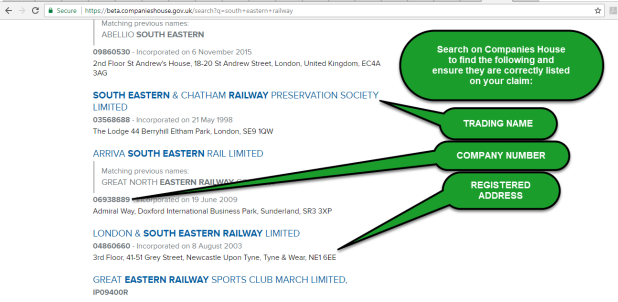
SouthEastern (This is their trading name)
https://www.southeasternrailway.co.uk/help-and-contact
LONDON & SOUTH EASTERN RAILWAY LIMITED (This is their registered name and the one to use on any claim)
Company number 04860660
Registered office address
3rd Floor, 41-51 Grey Street, Newcastle Upon Tyne, Tyne & Wear, NE1 6EE
https://beta.companieshouse.gov.uk/company/04860660
Southern (This is their trading name)
https://www.southernrailway.com/about-us/company-information
SOUTHERN RAILWAY LIMITED (This is their registered name and the one to use on any claim)
Company number 06574965
Registered office address
3rd Floor, 41-51 Grey Street, Newcastle Upon Tyne, NE1 6EE
https://beta.companieshouse.gov.uk/company/06574965
Thameslink (This is their trading name)
https://www.thameslinkrailway.com/help-and-support/contact-us
GOVIA THAMESLINK RAILWAY LIMITED (This is their registered name and the one to use on any claim)
Company number 07934306
Registered office address
3rd Floor, 41-51 Grey Street, Newcastle Upon Tyne, NE1 6EE
https://beta.companieshouse.gov.uk/company/07934306
16: Once you have your details you need then Go to moneyclaim.gov.uk and sign up, this will get you a Gateway ID number needed to sign in.
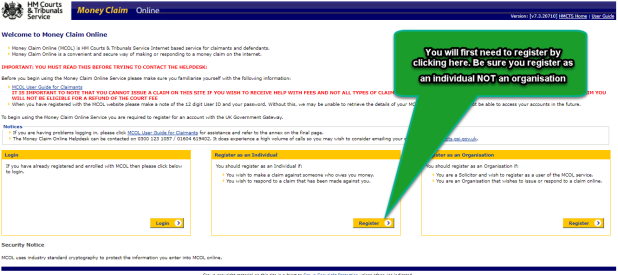
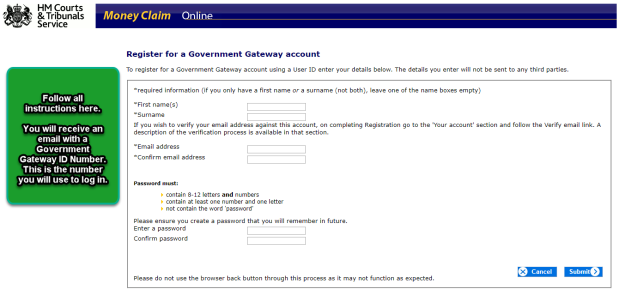
17: Once you have signed up, log in with your Government Gateway ID.
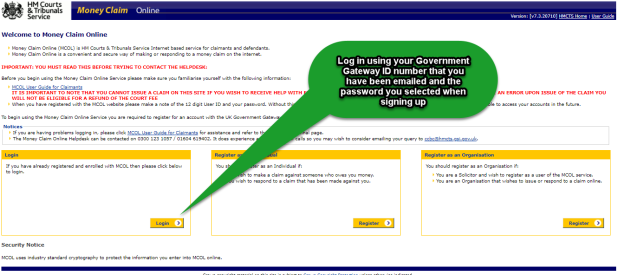
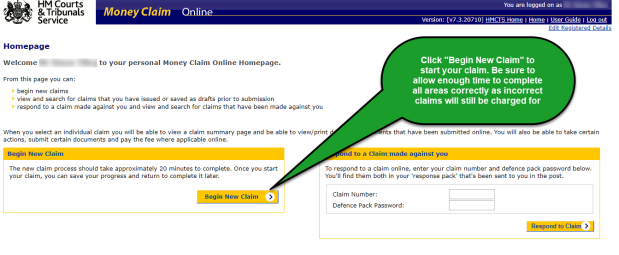
18: Once you have started your claim, there is a box that lists how much it costs to submit a claim, this is based on how much you are claiming. This amount is added onto the claim value and you can ask for the other side to pay for these costs.
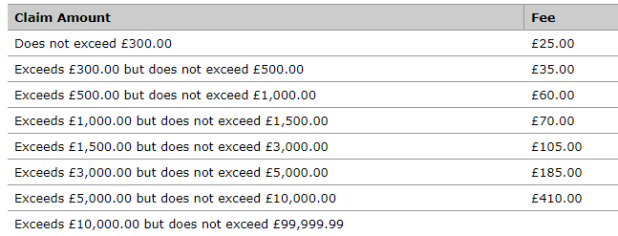
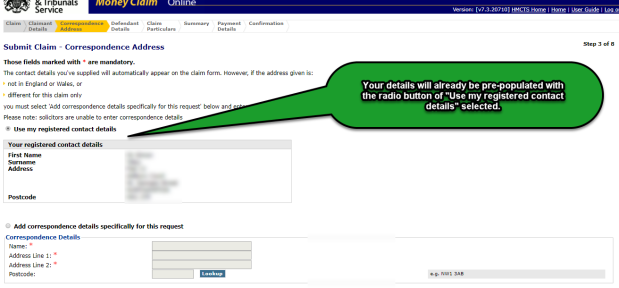
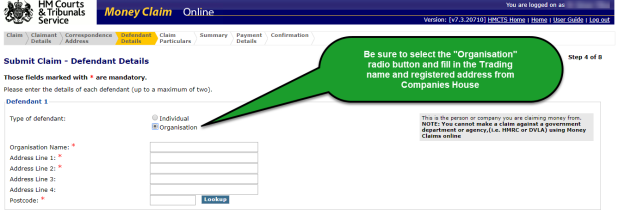
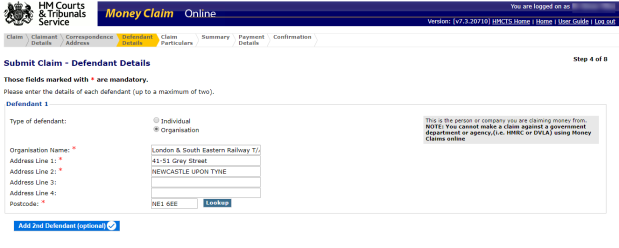
19: In almost all cases you will need to expand upon your claim, there is a small text box that allows you to give a brief overview, if you want to go into more detail then you will need to document an Additional Particulars of Claim (explained in the next section.) In order to do this make sure you tick this box at the top, it is very easily missed.

20: When filling in the details of your claim online you need to complete a basic Particulars of Claim, this is what head of law you are claiming under and briefly what you are claiming. You only get 24 lines of text with 45 characters on each line and a total of 1,080 characters, so you do need to keep this as succinct as possible. The below is an example you can use as you can go into much more detail in the Additional Particulars of Claim which is explained fully in the next section.
Breach of contract, specifically The National Rail Conditions of Travel.
Failure by The Defendant to carry out their duties as a service provider with reasonable care and skill contrary to The Consumer Rights Act 2015 S.49 (1).
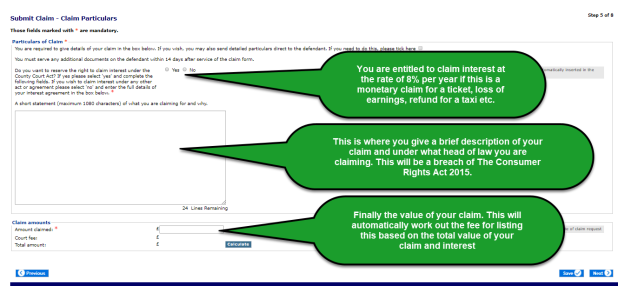
21: You can claim interest from the date the money became owed to the date you are submitting the claim. You are only allowed to claim 8% interest on any amount owed and if you select this option, MCOL will want a total amount of interest you are claiming to be listed, as well as a daily amount. The maths for working out the annual and daily amounts are below. For a claim of £70 your daily interest is around 1p per day so don’t get too excited.

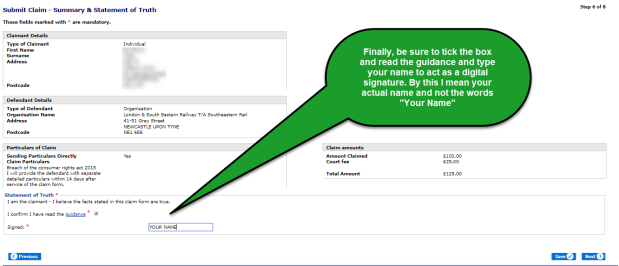
22: Once you have finished this process and paid the fee the website will allow you to download the form and give you a claim reference number. This form is called the N1 form. You have now “submitted” your claim.
In the best Blue Peter tradition, here is one I made earlier:
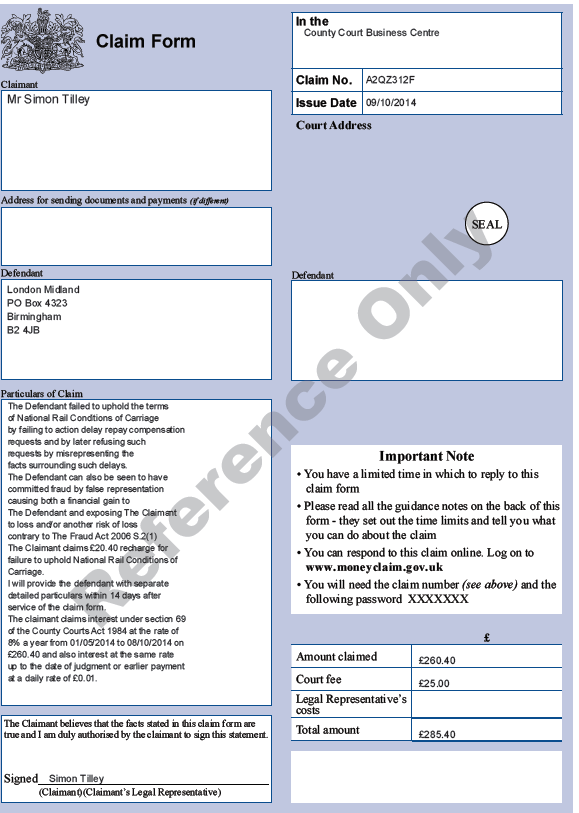
23: The claim form you have submitted will usually be issued the following day but this can take upto 2 “working days”. The timeline on MCOL will tell you the date this has been “issued.”
24: While the claim form will be “issued” within 2 working days, it will only be sent by 2nd class post and the court allows 5 “calendar days” from the date of issue for the service of the claim. Therefore the date your claim is “served” also known as the “date of service” is the 5th calendar day after the date it was issued.
25: The defendant has 14 “calendar days” from the “date of service” to file a response. If the last day for filing the response falls on a day that the court is not open (i.e. a weekend or public holiday), the court will allow the next full working day until 4pm for a response.
So if you submit your claim on Monday 30th April and your claim is issued on Tuesday 1st May then it can be deemed served on Sunday 6th This then creates a deadline for responding by Sunday 20th May. As this falls on a Sunday the date is extended until Monday 21st May.
OR
Alternatively if you submit a claim on Friday 4th May, this will not be issued until Monday 7th May and then deemed served on Saturday 12th This creates a deadline for responding of Saturday 26th May which is extended to Monday 28th May.
By submitting your claim only 3 days later this creates a different deadline of a week later so be sure to work out the correct deadline dates when submitting a claim. MCOL will know when the deadline is and will not allow you to enter a Judgement in default before the due date.
26: Below is a claim overview that showed previous actions taken when I had to sue a debt collector and issue a bailiff to attend their offices because they didn’t take their own advice and ignored all demands and court action, while this is probably the epitome or irony and a fine story, that will have to wait for another blog there folks.
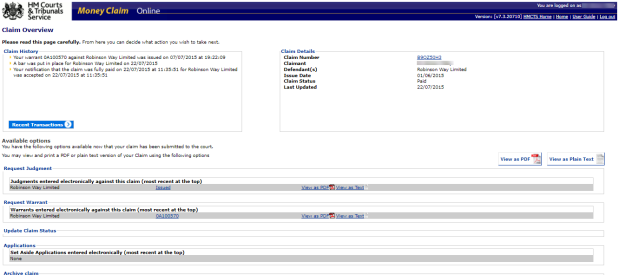
ADDITIONAL PARTICULARS OF CLAIM (POC)
27: The additional Particulars of Claim (POC) is a word document where you can expand upon your side of things to explain what went wrong, why you think the other side is at fault and a breakdown of the losses that you became exposed to and as such, which you are claiming back from the other side.
28: Use the number from the N1 claim form at the top right hand corner of your POC. This will ensure that when the Defendant gets this, they can marry this up to the original claim form.
29: I’ve made a VERY basic claim form below that shows the format and the basic information you need to include. Keep it factual and try to keep any subjective opinions or anything slanderous out of it.
I’ve made the claim with figures based on SouthEastern and based on a train being cancelled due to a lack of train crew. Hopefully this format should give you a headstart on the layout and structure of a claim form.
30: You can get all the quotable figures here as this is a public document from Go-via. https://www.go-ahead.com/content/dam/go-ahead/corporate/documents/2016-annual-report-PDFs/Business-Review-Rail.pdf
IN THE NORTHAMPTON (CCBC) Claim Number <<insert claim number from N1>>
BETWEEN:
<<YOUR NAME>>
Claimant
-and-
<<REGISTERED NAME>> T/A <<TRADING NAME>>
Defendant
PARTICULARS OF CLAIM
INTROUDCTION
- The Defendant is a limited company formed in England & Wales registered under number <<insert company number>>
- The Defendant operates under a franchise from the Department of Transport to provide rail services regulated by the National Rail Conditions of Travel. The Defendant has operated their franchise since <<insert date>>.
- The Claimant was at all materials times a customer of The Defendant.
- The Claimant holds a season ticket for travel between <<insert stations>> priced at £5000*amend as applicable. This ticket was purchased on or about <<insert start date>> and is valid until <<insert end date>>.
- The rolling stock used by The Defendant on this route are operated by class 376 228/5 ,465 348/4 & 466 168/2 Electrostar units. Each unit is comprised of between 2 and 5 carriages with each carriage having an average of between 45 and 84 available seats within it depending on the type used.
- The Defendant operate all rail services within a <<insert approximate distance>> miles of The Claimant’s local station of <<insert station>> where The Claimant’s season ticket is valid from. There is therefore no other competing rail operating within a reasonable distance that The Claimant may use as an alternative.
- The Defendant’s parent company’s own reports from 2016 show a total amount of annual Government subsidy paid to The Defendant as £61,000,000.
- The Defendant’s parent company’s own reports from 2016 show an annual total combined revenue for The Defendant as £8,000,200.
- The Defendant’s parent company’s own reports from 2016 show an annual total combined operating profit from all 3 of it’s rail franchises as being £57,000,000
FACTUAL BACKGROUND
- On 1st January 1999 The Claimant sought to board the 07:00 service from <<insert station>>.
- The Claimant regularly uses this services and avers that it always full with standing room only by the time it reaches it’s London terminus.
- The Defendant’s parent company Go-via acknowledges that reliance on voluntary overtime is an industry norm.
- The 07:00 was cancelled due to a lack of available train crew.
- The Claimant attempted to catch the 07:15. The Claimant was unable to board this service due to the extreme overcrowding with passengers from the 07:00 adding to the large volume of passengers.
- The Claimant had to wait until 07:40 to catch the subsequent service. The Claimant missed his/her connection at <<insert station where applicable>>.
- The Claimant subsequently arrived at work 1 hour late and was lost £XX in salary payments. The Claimant has received a verbal/written warning for their attendance due to constant delays.
- The nature of The Defendant’s business is that their staff will be mobile travelling on their services.
- The Claimant avers that due to the large volume of historical delays experienced within The Defendant’s franchise area that delays of The Defendant’s staff arriving and general lateness are to be anticipated and should be accounted for.
- The Claimant avers that due to the high volume of employees that The Defendant has, sickness and absence are also to be anticipated and should be accounted for.
- The Defendant’s own records from 2016 show they have approximately 4191 employees.
- The Claimant avers that The Defendant’s own records demonstrate an inadequate amount of fully trained and permanent train crew and drivers to cover all of their franchise requirements.
- The Claimant further avers that by failing to have enough staff to meet their franchise requirements, The Defendant cannot have any long term contingency plans to cover lateness or absence.
- The Defendant’s parent company Go-via were questioned by a Transport Select Committee on October 2016 about their failures to recruit adequate staff and being reliant on voluntary overtime. The select committee commented that “Any potential staffing issues should have been clearly foreseeable” and deem that this normal practise that doesn’t actually work efficiently as a “failure of basic due diligence”
SUMMARY
- The Defendant’s direct parent company Go-via concedes that they operate a policy of inadequate staffing to meet their franchise obligations instead relying on voluntary overtime. A failure to recruit enough staff to cover basic staffing requirements is at odds with The Defendant performing their duties with reasonable care and skill contrary to s.49(1) of The Consumer Rights Act 2015.
- The Claimant entered into a contract with The Defendant on <<insert season ticket start date>> based on the timetable available at the time. This timetable has remained consistent since the contract began with 4 trains per hour operating between the hours of 07:00 and 08:00 with an average of <<insert carriage number>> carriages per service. This represents approximately <<insert number of seats>> available seats.
- The Defendant failed to fulfil their obligations with The Claimant by failing to operate the service as advertised. The failure represented a breach of the contract between the parties.
- The failure by The Defendant to operate the service as advertised was due to an avoidable failure to have an adequate level of employees to operate the service or to compensate for any lateness or absence of employees.
- The Defendant was at all times in full control over their staffing levels.
- The lack of available staff was not new information, The Defendant would have always been aware there was an inadequate number of staff to cover all services. The Defendant chose not to run the advertised service as opposed to operate an alternative form of transport.
- The avoidable failures shown on the part of The Defendant exposed The Claimant to losses through lost income and ancillary damages through loss of reputation.
- The Claimant has no choice on what rail services he/she uses, all local services into central London are operated by The Defendant.
- The Claimant is in a non-negotiable position of needing to use The Defendant’s services for commuting irrespective of the reliability of the services.
- The Claimant avers that The Defendant operates a profitable business with no incentive to fulfil it’s contractual obligations due to being the only operator within the local area.
LOSSES
AND THE CLAIMANT CLAIMS:
- Refund of lost income incurred through The Defendant’s failures –£10.00 x 1 = £10.00
- Refund of taxi fares incurred through The Defendant’s failures – Taxi fare £45.50
- Interest pursuant to The County Court Act 1984 at 8% or as the court may deem fit;
- Costs incurred by The Claimant in bringing this claim;
- Such further compensation and/or other reliefs as this Honourable Court deems fit in respect of stress and inconvenience caused to The Claimant by the unlawful false representations perpetrated by The Defendant.
I believe that the facts stated in this Statement of Claim are true.
………………………………….
Signed the XXth day of <<insert month>> 2018.
<<INSERT NAME>>
ACTING AS A LITIGANT IN PERSON
XX XXXXX 2018
31: The particulars MUST include:
- The relevant details of, and background to, the parties involved – You and the TOC and your relationship as consumer and service provider.
- The essential ingredients of the cause of action which, if proved, would give the claimant a right to the remedy claimed – You were delayed by XX amount of hours due to lack of staff/displaced staff/maintenance issue. You were denied delay repay as the TOC lied about delays or claimed you were not on the train in question. Include the relevant underpinning law such as NRCoT and CRA 2015.
- The remedies sought – What your losses were.
- Costs breakdown – How you arrived at £100. If you were delayed for 5 hours and you are paid £20 per hour.
- A statement that the claimant has suffered loss and damage and particulars of the loss and damage suffered.
- A claim for interest, whether under the terms of a contract, statutory provision or on some other basis.
SERVING YOUR ADDITIONAL (POC)
32: When submitting additional Particulars of Claim be sure to do so in a timely fashion. The 14 calendar day deadline clock only starts when the defendant has been “served” all paperwork relating to a claim.
33:You can serve the POC by post, fax, email or even by hand if this is easier for you. Please remember that whatever way you choose to do so you may well need to keep evidence that this has been served. If the Defendant claims you have not sent the POC and you cannot provide evidence that this has been sent, the court may very well grant an extension allowing them time to craft a Defence. In these cases do not rely on the honesty of the other side to admit receipt of anything where you do not have proof of this.
34: After serving your Additional POC be sure to complete a Certificate of Service form N215 and send this to the CCBC along with proof of your service, this can be forwarding the original email, scanning in a postage receipt or fax transmission report. ccbc@hmcts.gsi.gov.uk
35: More details on service of documents can be found here: https://www.justice.gov.uk/courts/procedure-rules/civil/rules/part06#6.26
A SMALL TIP
 Serving paperwork by 1st class recorded delivery will ensure you obtain a signature and proof the documents were delivered. While emailing over a word document is easier and cheaper, this does not prove anyone at the other end receives this unless you request they acknowledge receipt with a return email. A word document is also easier to search specific items, copy & paste and generally manipulate to help the other side to form a defence.
Serving paperwork by 1st class recorded delivery will ensure you obtain a signature and proof the documents were delivered. While emailing over a word document is easier and cheaper, this does not prove anyone at the other end receives this unless you request they acknowledge receipt with a return email. A word document is also easier to search specific items, copy & paste and generally manipulate to help the other side to form a defence.
 An email will be saved, forwarded or attached to an Outlook calendar reminder and can be retrieved and forwarded on many times. A single paper copy document in a busy office has a higher chance of being lost, damaged or left in an in tray and forgotten about, resulting in you being able to request a Judgement in default against the other side.
An email will be saved, forwarded or attached to an Outlook calendar reminder and can be retrieved and forwarded on many times. A single paper copy document in a busy office has a higher chance of being lost, damaged or left in an in tray and forgotten about, resulting in you being able to request a Judgement in default against the other side.
RESPONDING
36:The Defendant has 14 days from the date of service to respond to the claim. They can choose to either:
- Admit they owe you all the money directly – The form confirming this should be sent directly to you rather than the court. This is the most hassle free outcome.
- Contact you directly on a “without prejudice” basis offering some or all of the money in exchange for withdrawing proceedings – This is similar to the above scenario and while it means you get a hassle free pay out, they will usually request a confidentiality agreement meaning the contents of your case and any figure paid cannot be made public nor shared with any other party.
- Acknowledgment of Service (AOS) – Indicates that the defendant acknowledges the claim and intends to file a defence, but needs more time to do so, the AOS extends the time to do so from 14, to 28 calendar days from the date of service.
- Full defence – The Defendant wishes to dispute the full amount of the claim. You will be provided with the defence and asked to file a directions questionnaire.
- Counterclaim – The Defendant wishes to dispute the full amount of the claim and also files a claim against you. The Defendant will need to pay a fee to make a counterclaim. (Please be aware that if you withdraw your claim the case will continue on the counterclaim alone). You will need to file your response to the counterclaim in the same way the defendant filed a defence, failure to do so could result in the defendant applying to enter Judgment against you.
- No response – The defendant does not respond within the permitted timeframe, this will allow you to enter a Judgement in Default on MCOL meaning that you have won your claim and are legally entitled to pursue your judgement as County Court Judgement against the Defendant. This can happen for a myriad of different reasons generally down to administrational ineptitude and carelessness. A judgement in default can however be appealed and overturned if acted on quickly enough with good enough reasons.
ENFORCING A CCJ
37: Should you be lucky enough to obtain a Judgement in Default then consider what caused this? If The Defendant has forgotten to respond to your Claim, a boasting or egotistical email or post on social media demanding money for your CCJ will alert them to this error. Should they claim this was an error on their part quickly enough it is highly likely that a Judge will overturn the CCJ and allow them to defend the Claim.
38: It would be much wiser to write a very simple and polite request for payment listing the claim number, amount and your address for a cheque or bank details for a BACS payment. The more low key and generic your email is, the more likely this will be filed in a “to do” list to be dealt with at a later date.
38: If after 14 days you receive no reply nor any payment and there is no communication from the Court to say the CCJ is being challenged then you can move onto enforcement. If the CCJ is for less than £600 you can ONLY use a County Court Bailiff, if your claim is for more than £600 you can choose between a Bailiff and a High Court Sheriff.
38: Using a Bailiff requires form N323 and costs a set fee which is added to the amount they recover. This can be done using MCOL paying the fees via credit card. Enforcing debts against businesses is a very straightforward situation. The business will have a head office with an open reception with lots of computers, chairs and other items for a Bailiff to levy and remove, most business will NOT want the embarrassment of a Bailiff on site potentially removing good and will seek to raid petty cash or rush down a senior member of staff with a company credit card to make payment. If this happens you will be sent a money order shortly from the court with your CCJ amount and fee that you paid to instruct the Bailiff.
39: Using a High Court Sheriff requires form N293A and costs £66 to transfer your debt up to the High Court. You will need to send a sealed copy of the Judgement from the CCBC. There is no time limit on how long this can take, I have had some take as little as 2 days before. Once you have the sealed copy of the Judgement you will send this with form N293A to a Sheriff of your choice.
40: If anyone has ever watched the BBC show The Sheriffs are coming then you will know just how successful they are http://www.bbc.co.uk/programmes/b01q1j5d
41: If like me, you are a fan of the TV show and wish to use your favourite Sheriffs from the TV show, this is their website https://thesheriffsoffice.com/
42: Once you have sent the forms off along with a £66 payment fee and let the Sheriffs Office do their work. If you do get a direct payment from the Defendant then you MUST let the Sheriffs know ASAP as a failure to do so could result in you being billed for their time trying to get payment that you have already received.
PURSUING A DEFENDED CLAIM
43: It may seem deflating if you have put in a Claim where you feel you were in the right only to receive a very tight and well worded Defence attempting to discredit everything you have said, it may even request your claim is struck out and accuse you of lying. Do not panic as this is exactly what the Defendant wants you to think. They may very well offer a paltry sum to withdraw proceedings hoping you will think you have no chance of winning.
44: Claims that are allocated to the small claims track are far less formal than what you may have seen on TV. Generally speaking unless there are exceptional circumstances there will be no award of costs to a winning party so even if you do lose your claim, you will not be liable for any inflated costs the Defendant may try to scare you with before the hearing. Once your claim is transferred to a local County Court you will receive a directions order instructing when document bundles and witness statements are to be exchanged before being allocated a hearing, sometimes several months in the future.
45: Preparing documents and witness statements is a time consuming practise, moreso for the Defendant as they may have multiple people in their business who played a part in your claim and a vast array of documents to obtain. Spending 10 man hours interviewing staff and printing documents to defend off a £100 claim is not cost effective and they may well pay you off as this is the cheapest and most hassle free option.
46: If they do not then drafting your witness statement can be done by using any complaint letter or your POC as a start and adding in more details as needed and referencing in the folder of evidence you have kept. As a Claimant you will find this process easier as you will be relying on your own memory and notes and can use the evidence mentioned at the very start in point 1 that you have to jog your memory on events.
47: When it comes to having a day in Court, there are other websites that will offer far more detailed advice but the main point to remember is that so long as you have drafted a well-structured POC, with evidence to back up all your points and presented everything in an organised and easy to read fashion for the Judge then your job is to go in and present your case, have a list of questions for the other side where their versions of events do not make sense and answer any questions the Judge may have for you.
SEEING A GENUINE DEFENCE IN RELATION TO A CLAIM
48: Below is the Defence issued by Go-via in 2017, I’ve only included relevant paragraphs from my Claim and their replies as there is a lot to dissect here.
49: Knowing what they will say in a Defence doesn’t wave a magic wand but does give you a valuable insight into what a train operator will say, the type of argument they will use and how they will bend the truth in order to discredit you as a Claimant. It is my hope that by seeing this you can amend your claim accordingly, research the documents they rely on and maybe find arguments to support your case and word your claim much tighter to avoid any of the lines below stalling your claim.
| CLAIMANT’S CLAIMS | GO-AHEAD GROUP’S REPLY |
| 1. The Defendant is a limited company formed in England & Wales operating under a franchise from the Department of Transport to provide rail services regulated by the national conditions of travel. The Defendant has operated their franchise since 2007. | 8. The Defendant admits Paragraph 1, save that in relation to the National Rail Conditions of Travel (NRCoT):
a. The NRCoT set out the contract between passengers and Train Operating Companies. b. Train Operating Companies are required to contract of the basis of NRCoT (Chitty 36-065) |
| 2. The Defendant reports that their passenger revenues in July 2016 were at £330 million. | 9. Paragraphs to 2 – 4 are not admitted and the relevance of paragraphs to 2 – 4 is denied. |
| Why are the Go-Ahead group denying this when their own document claims this at Page 2? | |
| 3. The Defendant receives variable public subsidies of around £52 million each year from the treasury. | 9. Paragraphs to 2 – 4 are not admitted and the relevance of paragraphs to 2 – 4 is denied. |
| Why are the Go-Ahead group denying this when their own document claims this at Page 3? | |
| 4. The Defendant’s parent company Go-Ahead reported annual pre tax profits in July 2016 of £99 million. | 9. Paragraphs to 2 – 4 are not admitted and the relevance of paragraphs to 2 – 4 is denied. |
| This is an accurate rebuttal, I had gotten my figures wrong as this £99M was just for bus which was quoted in the news. Surprisingly they don’t correct the error showing they actually made £57M for rail with a combined group profit of £157.4M
https://www.ft.com/content/54df186c-70e4-11e6-a0c9-1365ce54b926 |
|
| Conclusions:
They do not like being seen as receiving large subsidies in the millions from the treasury while making millions in operating profit. While this information does not help prove or disprove the elements of the claim, it puts any actions in the correct context. Govia claiming they do not accept ALL of these paragraphs cannot be upheld and their statement in the Defence is a misrepresentation of the truth |
|
| 5. The Claimant is a self-employed individual who performs audit and compliance fieldwork for various clients on a contract for services basis, The Claimant routinely uses rail services provided by The Defendant. | 10. The Defendant is unable to admit or deny paragraph 5 of the “particulars” and puts the Claimant to proof of the same. |
| Email evidence was provided to them during correspondence with screenshots of my work allocation for 2 different companies along with timing restrictions for both. Information has been redacted here but all information was provided to Govia.
Email sent to Govia 29th October 2016 with the below screenshots https://ibb.co/jACG9n ORR work screenshot attached in email https://ibb.co/cycoN7 ORR work screenshot attached in email https://ibb.co/bHUPvS Other various work at train stations https://ibb.co/c2cYpn Other various work at train stations showing time restrictions https://ibb.co/dOeeUn |
|
| Conclusions:
They may as well just accept this rather than be pedantic given how my self-employed status forms a large part of their defence later on and why ask for proof they already have? |
|
| 6. Between the periods of June 2012 – December 2012 The Defendant delayed, amended or cancelled such a significant percentage of their services due to deliberate understaffing in breach of their franchise that the then Prime Minister David Cameron issued a public warning that The Defendant could and would have their franchise removed if they did not improve their services. | 11. In relation to paragraph 6 the relevance of services for a period of a few months nearly 5 years ago is denied as being relevant to the Claimant’s claim and not admitted. |
| What are they actually denying in the paragraph;
That the then PM didn’t make this statement? http://www.bbc.co.uk/news/uk-england-20663753 He did That they do not understaff? http://www.bbc.co.uk/news/uk-england-20156382 They do That any understaffing is deliberate? http://www.bbc.co.uk/news/uk-england-20038741 It is, rostering all staff during the 2012 Olympics without any planning for when they take leave and the comment about overtime only going so far. Why are they claiming not having enough staff 5 years ago and still not is not relevant? A Go-Ahead franchise was specifically referenced in a select committee in October 2016 – Pages 13-15, s.24-31 – https://publications.parliament.uk/pa/cm201617/cmselect/cmtrans/64/64.pdf |
|
| Conclusions:
They seem to really want to distance themselves here from any previous poor performance and go as far to deny the whole paragraph to present themselves in a better light. Govia claiming they do not accept the version of events cannot be upheld and their statement in the Defence is a misrepresentation of the truth. |
|
| 7. In October 2014 The Claimant was forced to issue civil proceedings against The Defendant under Claim A2QZ312F for fraud by false representation relating to several cancelled trains as The Defendant had repeatedly denied any delays or cancellations had taken place at all, rejecting The Claimant’s complaint. Upon receipt of The Claim with evidence proving the delays The Defendant acknowledged their position, paid the full value of The Claim. A Judgement by Admission is recorded against this Claim. | 12. It is denied paragraph 7 is relevant to the Claim. This relates to a previous action and does not evidence acceptance by the Defendant of the Claimant’s version of events. The claim was settled on a commercial basis.
5 The Claimant pleads a number of unfounded and inadequately particularised allegations and inferences of dishonesty against the Defendant. These should be struck out as, as failing to disclose reasonable grounds for bringing the claim is an abuse of process. 6 It is submitted that where a claimant seeks to infer dishonesty or makes allegations of the nature set out in the Claimant’s claim and due to the fact by their nature they require a higher burden of proof, they should be based on facts and not merely the opinion of the claimant and should be relevant to the claim, in relation to the establishment of a cause of action, causation or the basis upon which the damages claimed can be sought at law |
| The train WAS cancelled and delayed as seen here. https://ibb.co/eYb19n
An email was sent after my delay repay claim was logged and ignored with staff claiming no delays. https://ibb.co/fR8cX7 I emailed the MD on 30th September with evidence and this was ignored. https://ibb.co/e6fNh7 I posted on social media warning I would start a civil claim as there was little other recourse. https://ibb.co/jiQKh7 Govia ignored my warning and a claim was issued for £260.40 citing fraud by false representation. https://ibb.co/eyPA27 The claim was posted on their social media page which then started to get things moving. https://ibb.co/mrNApn Their email apologises multiple times and make no reference to settling this on a commercial basis nor refusing to accept liability and even paying me £300 which is more than the value of the claim and costs of £285.40. https://ibb.co/jjyypn A judgement by admission against Govia is on file at the court and as of April 2018 remains unchallenged. https://ibb.co/de9uK7 Civil Procedure Rules 14.1 (5) The permission of the court is required to amend or withdraw an admission. https://www.justice.gov.uk/courts/procedure-rules/civil/rules/part14#14.1 |
|
| Conclusions:
· Claim A2QZ312F WAS submitted citing dishonesty in claiming no delays and refusing to pay and then ignoring me. · Claim A2QZ312F was NOT defended nor any facts EVER disputed. · The full value of Claim A2QZ312F was paid. · There was NO statement made when paying of not accepting liability and therefore with no offer there can be no retroactive claim by the other party that Govia was somehow not liable. · A Judgement by admission IS recorded on file with HMCTS against Claim A2QZ312F. Govia claiming they do not accept the version of events cannot be upheld and their statement(s) in the Defence are a misrepresentation of the truth. |
|
| 8. On 8th September 2015 around 08:00 one of The Defendant’s busy early morning commuter train services caught fire while in service forcing 150 people to be evacuated at Warwick Parkway Station.
9. On 26th November 2015 around 08:05 one of The Defendant’s busy early morning commuter train services on an identical route again caught fire while in service forcing 200 people to be evacuated at Lapworth Station in Warwickshire. 10. The Defendant reported both incidents separately to the Rail Accident Investigation Branch, in each report the cause of both fires was identical. The Defendant had identified remedial work to take place to prevent this fire but did not implement any of this work prior to the second fire. |
13 It is denied that paragraphs 8 – 10 are relevant to the claim.
|
| Why in a claim citing inadequate maintenance is evidence showing prior identical and avoidable faults on identical trains on the same route mere weeks apart, run by the same TOC somehow not relevant in determining if their maintenance was lacking?
Lapworth – http://www.bbc.co.uk/news/uk-england-34932308 Warwick Parkway http://www.dailymail.co.uk/news/article-3226179/Terrifying-moment-smoke-billows-train-fire-broke-forcing-150-commuters-evacuated.html The information was requested from the RAIB who confirm the incidents had identical causes. https://ibb.co/iyVxh7 https://ibb.co/mZnch7 https://ibb.co/eRJTpn |
|
| Conclusions:
Govia claim whole sections of the Claim are not relevant when trying to evidence a lack of care and attention in their maintenance. Prior instances of poor performance ARE in fact most relevant to a claim about current poor performance due to lack of care and attention being shown as they help prove or disprove patterns of behaviour. |
|
| 11. Northampton station is on a branch from the mainline managed by The Defendant, aside from 2 Virgin Trains every day the only scheduled passenger trains that pass through the station are those under the control of The Defendant. | 14 In relation to paragraph 11 it is denied that Northampton is on a branch line. It is part of the west coast mainline and is managed by Network Rail. |
| Northampton station IS managed by Govia’s brand London Midland NOT Network Rail. While not a branch line it is on a loop and has aside from the 2 Virgin Services all services are provided by Govia. | |
| 12. Northampton station has 3 platforms | 15 Paragraph 12 is admitted. |
| 13. On or around 20th October 2016 The Claimant was offered and accepted various one off jobs in London from various clients for 28th October 2016 as is the norm for his employment status. These clients included The Office of Road & Rail (ORR) and South West Trains (SWT) amongst others.
14. The Office of Road & Rail (ORR) required The Claimant to assess peak time ticketing options from two different train provider ticket machines at St Pancras International station before 09:00 on 28th October 2016 submitting photographic evidence. Each assessment was to take no more than 3 minutes each, The Claimant was to be paid £13.00 per ticket machine assessed and reported on. 15. South West Trains (SWT) required The Claimant to visit a specific station in south London, purchase a peak time ticket before 10:00 on 28th October 2016 and travel on a service into London submitting photographic evidence and writing a report on the experience including departure and destination stations. The Claimant was to be paid a £10.00 fee and reimbursed the cost of a ticket upto the value of £150.00. The Claimant was entitled to keep and use the ticket as this taxable benefit formed part of the payment structure. The value of the ticket The Claimant was to purchase was £58.60 16. The Claimant had 2 smaller ad-hoc visits paying £4.75 each. The total value of The Claimant’s earnings were £45.50 in payment fees and a train ticket for use at a cost of £58.60 totalling £104.10. All visits were required to be completed on or before 28th October 2016. |
16 The defendant is unable to admit or deny paragraph 13 to 16 and puts the claimant to proof of the same. The claimant has failed to set out the applicable tax on the value of the train ticket he claims was to be provided by South West Trains and therefore the loss in this respect. |
| Email evidence was provide showing the work and fees paid prior to the Claim being submitted so why therefore deny it? https://ibb.co/jACG9n | |
| Conclusions:
Govia have evidence of the monetary loss, the only advantage to disputing this is to muddy the water and divert the Court’s focus away from the issues to be decided. The tax element of this is another attempt to discredit the value being claimed for. |
|
| 17. On 23rd October 2016 The Claimant purchased an advance 1st class train ticket from Northampton to London Euston. This ticket limited The Claimant to use of a specific train service provided by The Defendant, namely the 07:00 arriving into London Euston at 08:02 on 28th October 2016. The cost of this ticket was £19.00 | 17 It is accepted that Defendant purchased an advance 1st class ticket for use on the 7am train from Northampton to London Euston on 28th October 2016, operated by the Defendant. |
| Aside from the fact they claim they bought the ticket other than me this is a fact that is not disputed. | |
| 18. The Claimant intended to travel on the 07:00 service from Northampton to London Euston as this allowed time to walk to St Pancras Station, perform the 2 ORR visits and smaller ad-hoc visits and be at Kingston station in time for the South West Trains visit. The Claimant would earn a net profit of £85.10 | 18 The defendant is unable to admit or deny paragraph 18 and put to the defendant to proof of the same |
| They were presented with evidence that some of my work was time specific and the fees I would earn for these. https://ibb.co/cycoN7 https://ibb.co/bHUPvS https://ibb.co/c2cYpn https://ibb.co/dOeeUn | |
| 19. Paragraphs 19-21 relate to the delay itself | This specific part of the defence relate to the delay itself |
| 20. Paragraphs 19-21 relate to the delay itself | this adds no value to a generic claim and has been omitted |
| 21. Paragraphs 19-21 relate to the delay itself | |
| 22. The Claimant eventually arrived into London Euston at 08:45 managing to disembark and leave London Euston at 08:50 due to the extreme overcrowding of the delayed 07:10 service. | 23 In relation to paragraph 22 that Defendant admits the 07:10 service arrived at London Euston at 8:46 a.m. and is unable to admit or deny when the claimant disembark the 07:10 service at the time stated. It is denied that the service was extremely overcrowded.
4 The Claimant fails to adequately particularise the claim and does not mention which train service he was travelling on. |
| It is quite obvious by the statement of the original departure time of the 07:10 & arrival time of this at 08:45/6 at the destination of London Euston what service that I ended up travelling on. | |
| 23. Due to the extreme delay The Claimant was unable to conduct either The ORR visit or the South West Train visit. The Claimant was only able to conduct the 2 smaller visits earning only £9.50. | 24 The defendant is unable to admit or deny paragraph 23 save that it denies the service was extremely delayed and puts the claimant to proof in relation to the visits mentioned. It is denied that a delay of 45 minutes is an extreme delay. The NRCoT set out there is a minimum requirement to provide a partial refund for a delayed train service of one hour and is indicative of what would be considered to be an unreasonable delay within the rail industry. Delays on train services are therefore reasonably anticipated. |
| It is quite evident that 2 time specific visits to be completed before 9am at St Pancras are not possible to be completed when arriving into a different London terminal of Euston at 08:46 and allowing for travel time between the two locations in rush hour.
The link shows walking time being 13 minutes, while slightly quicker taking the Underground this can also be increased during rush hour. https://ibb.co/k0039n |
|
| 24. This paragraph relates to where the fault occurred | This specific part of the defence relate to the delay itself |
| this adds no value to a generic claim and has been omitted | |
| 25. On 29th October 2016 The Claimant posted on The Defendant’s social media page questioning why there was a delay. An employee of The Defendant responded with comments such as “get the bus then!!” & “Maybe you should moan to the bus company to put buses on then.” & “I am defending our staff who are sick of all the abuse we get from the public.” | 26. The defendant is unable to admit or deny whether the claimant posted on it social media page on 29th of October the relevance of paragraph 25 is denied |
| The original post with the standard rebuttal of “get the bus” was deleted very quickly but abuse for other passengers continued.
Deleting posts that exposed bad service and even insulting customers over email before forwarding the email chain back to them by members of the marketing team was common. https://ibb.co/fMWJ9n https://ibb.co/nPH3aS https://ibb.co/mku5pn https://ibb.co/c5v0N7 https://ibb.co/doCEh7 https://ibb.co/gAgeFS https://ibb.co/k0TtaS https://ibb.co/n5nfN7 |
|
| Conclusions:
Govia were well aware of posts being deleted from their social media page, the page was later amended to prevent any comments being made with all prior history deleted. Their statement of being unable to admit or deny my posts are a misrepresentation of the truth. The relevance of their staff making comments on a public forum apparently on their behalf is also very relevant. |
|
| 26. In response to comments from The Defendant’s social media page The Claimant emailed his complaint to comments@londonmidland.com. The Claimant cited the failure of the cancelled train in question as due to a lack of adequate maintenance, The Claimant further cited that The Defendant’s failure to dispatch the subsequent train on time as a failure to perform their duties with due care and attention contrary to The Consumer Rights Act 2015. The Claimant requested a refund of the £94.60 losses he had been exposed to.
27. The Defendant replied entering in a conversation ultimately refusing to compensate The Claimant stating that the burden of proof fell with The Claimant to prove the failure to perform their duties with due care and attention. |
27 In relation to paragraph 26 and 27 it is admitted that the claimant complained to the Defendant claiming that the cancellation of the 7am service and delay to the two subsequent service was a breach of its obligations pursuant to the Consumer Rights Act and claim losses of £94.00. The Defendant responded explaining the cause of the fault on the 7am service and its position that this and the reason the two subsequent services were delayed did not constitute a failure to provide the service with reasonable care and skill.
28 The delay to the journey would not have qualified for a full refund of the train ticket under the NRCoT or the defendant’s passenger charter. |
| They admit to me emailing a complaint and that they responded. | |
| 28. The Defendant has previously demonstrated that they do not perform adequate maintenance on trains that they lease. The reason for reduced maintenance can only be one of cost saving to increase profits. This failure to maintain trains is at odds with The Defendant performing their duties with reasonable care and skill. | 30 Paragraph 28 is denied in its entirety the Defendant does operate adequate maintenance on its fleet of trains. It is denied the Claimant has evidenced that this is not the case and in respect of the earlier incidents referred to and the Claimant appears to be relying on his own opinion in this regard. The Claimant further appears to rely on his own unfounded opinions of the reasons for this. It is denied in the event that these incidents referred to by the Claimant evidence a claim that the services on the 28th of October 2016 that are the subject matter of this claim will not perform with reasonable care and skill. |
| 29. The Defendant’s direct parent company Govia openly admits in press interviews that they operate a policy of inadequate staffing to meet their franchise obligations instead relying on voluntary overtime. This policy results in regular disruptions to scheduled services, such policies do allow for reduced pension, holiday and employer related costs to again increase profits for The Defendant. This policy is at odds with The Defendant performing their duties with reasonable care and skill. | 31 In relation to paragraph 29 the Claimant makes a generalized and unfounded statement of his own opinion about unspecified dated or contextualize comments from the director of a separate legal entity the relevance to this claim is denied. The Claimant does not believe that the Defendant’s services on 28th October were affected by staffing issues. The Claimant does not explain why his opinion regarding normal overtime arrangements in the industry and in relation to separate legal entity can be relied upon to evidence that the Defendant did not provide three services on the morning of 28th October 2016 with reasonable care and skill. |
| If having inadequate staff and being reliant on overtime is normal in the industry why does this result in so many cancellations and a failure to meet their franchise obligations. Is failure to meet franchise operations the norm?
London Midland were reported in the news as having inadequate staffing due to rostering staff on to cover the 2012 Olympics with no plans for how to cope when these staff took leave later in the year. http://www.bbc.co.uk/news/uk-england-20156382 Overtime would only go so far to cover the staff shortfall. Failing to recruit and retain enough staff is therefore a relevant point that they cannot defend. http://www.bbc.co.uk/news/uk-england-20038741 If so non relevant why did a transport select committee in 2016 conclude about Govia that “Any potential staffing issues should have been clearly foreseeable” and deem that this normal practise that doesn’t actually work efficiently as a “failure of basic due diligence” https://publications.parliament.uk/pa/cm201617/cmselect/cmtrans/64/64.pdf |
|
| Conclusions:
While comments referenced were about a separate legal entity, it shares the same parent company and it is the practise itself which Govia do not deny and refer to as “normal overtime arrangements in the industry” which is the point. The findings of the select committee of a “failure of basic due diligence” are at odds with Govia’s pleadings of performing duties with reasonable care and skill. A business that fails to recruit and retain enough staff and has NEVER had full staffing levels cannot be seen to be performing it’s duties with reasonable care and skill even if the cause of the claim is not a direct result of this. |
|
| 30. The Defendant has previously lied to The Claimant about delays and cancelled services continually and systematically refusing to issue a refund only conceding the point admitting they had lied and issuing a payment when a civil Claim was issued. The net benefit for failing to issue compensation in line with delay repay obligations prior to a civil claim being issued is again one of increased profits for The Defendant.
Through deliberate misdirection or poor administration, lying that a service was not cancelled until presented with evidence in a civil claim, The Defendant cannot be seen to be performing their duties with reasonable care and skill. |
33 The rail industry is heavily regulated and train operating companies provide information which forms the public performance measure which is available to the public, information about delayed and cancelled trains is updated automatically to live departure board wiring system of electronic trigger’s on railway tracks and at stations this information is publicly available for a period of time after the journey the inference that incorrect details about delays and cancellations are deliberately or systemically provided to customer’s is fanciful.
34 The claimant fails to set out a factual basis or the relevance upon which he seeks to make an inference of dishonesty against the Defendant. The Claimant provides no reasonable grounds for this pleading and it is submitted that in its inclusion within the pleadings it is an abuse of process |
| The train WAS cancelled and delayed as seen here. https://ibb.co/eYb19n
An email was sent denying such cancellations asking me for proof on 27th August. – This was not new information and they would have always known the trains were cancelled in both directions. https://ibb.co/fR8cX7 Proof that was sent was then ignored for another month. A follow up email was sent to the MD again with the evidence on 30th September. https://ibb.co/e6fNh7 I posted on social media warning I would start a civil claim as there was little other recourse. https://ibb.co/jiQKh7 Govia ignored my warning and a claim was issued for £260.40 citing fraud by false representation. https://ibb.co/eyPA27 The claim was posted on their social media page which then started to get things moving. https://ibb.co/mrNApn Their email apologises multiple times and make no reference to settling this on a commercial basis nor refusing to accept liability and even paying me £300 which is more than the value of the claim and costs of £285.40. https://ibb.co/jjyypn A judgement by admission was lodged and accepted by Govia and is recorded at the court as such. https://ibb.co/gDu4Un Civil Procedure Rules 14.1 (5) The permission of the court is required to amend or withdraw an admission. https://www.justice.gov.uk/courts/procedure-rules/civil/rules/part14#14.1 |
|
| The conclusions:
· A lack of train crew to run a service would mean that any delay repay is paid by the Train Operating Company from their own profits as they have liability for the delay. · Govia DID ignore the initial claim for delay repay despite this generating a reference number on their internal system. · Govia DID lie and claim no delays when in fact there were delays asking for proof before looking at this again. · Govia DID ignore progressing a valid claim from the point of having the information for 8 weeks and 6 weeks from having irrefutable evidence with the MD himself being aware. To claim in their Defence that they did not lie previously and did not ignore a delay claim that they were responsible and financially liable for is a misrepresentation of the truth. The pleading I make of dishonesty CAN be proven and it is valid to include any such example in a claim. |
|
| 31. The Claimant entered into a contract with The Defendant. The Claimant paid for travel into London at 07:00 arriving at 08:02 on a service provided by The Defendant at a cost of £19:00. The Claimant paid for 1st class to enable a seat and use of an electrical socket for the journey. The Defendant failed to fulfil their obligations with The Claimant by failing to dispatch the subsequent train on time resulting in The Claimant arriving at 08:45 and not having use of a seat for his journey much less any use of 1st class. | 35 34 Limitation of a train company’s liability
Except as shown above, Train companies will not accept liability for any loss (including consequential loss) caused by the delay and/or cancellation of a train service. However they will consider additional plans in exceptional circumstances.
This section and section 32 do not affect rights and remedies you would otherwise have under the Consumer Rights Act 2015 unless the law allows this.
36 It is submitted that the Defendant has no liability other than to make refunds as set out in the NRCoT.
40 The Claimant’s claim is based on a claim under the Consumer Rights Act 2015 (CRA) that services were not provided with reasonable care and skill. It is accepted that the defendant is a service provider for the purposes of the Act.
41 It is denied that the Consumer Rights Act applies in relation to the Claimant’s claim CRA Part 1, Chapter 1, Part 2, key definitions (3) sets out:
“Consumer” means an individual acting for purposes that are wholly or mainly outside that individual’s trade business craft or profession.
42 The Claimant sets out in paragraphs 13 – 18 of his Particulars that his travel on the date in question was for the purpose of carrying out work on a self-employed basis for the ORR, Southwest Trains and others. The Claimant could not have therefore been acting for purposes that were wholly or mainly outside his trade business craft or profession.
43 The CRA applies only to contracts between consumers and Train Operating Companies.
44 Section 49 of the CRA sets out that:
“Every contract to supply a service is to be treated as including a term that the trader must perform the service with reasonable care and skill.”
45 Section 56 of the CRA sets out of the remedy for a breach of s49 is a price reduction or in specified circumstances a repeat performance. 46 The Claimant was able to use another service to reach his destination. The only other remedy provided by the CRA for a failure to provide services with reasonable care and skill is a price reduction. The price reduction can be the full cost paid for the service.
47 The Defendant has already refunded the Claimant the full cost of this train fare and therefore there can be no further liability under the CRA. The CRA does not provide any contractual or statutory right for the Claimant to claim the losses which form the basis of the claim. |
| Conclusions:
According to Govia if you buy a ticket to travel to your place of work you are somehow not a consumer and not afforded any rights under the Consumer Rights Act 2015. · If I put fuel in my car to travel to my 9-5 office job, this does not make my car a commercial vehicle, nor does it change the transaction to a B2B arrangement. Were this petrol/diesel to damage my car and prevent me from getting to work, it would be reasonable to claim consequential losses for loss of earnings. · A supplier provides electricity and water to my home to enable me to wash and iron my clothes for work, this does not make my utility supply a commercial agreement nor change my property from a residential to a commercial property. Were my home without power or water and I was unable to clean and iron my clothes for work it is reasonable to claim some small consequential losses. · If I purchase food for breakfast, lunch and dinner to sustain me for work, this still remains a consumer agreement between me and my supermarket of choice. If food purchased was spoiled and gave me food poisoning, could the supermarket claim that as this was eaten as my lunch at work that I am no longer a consumer and cannot claim consequential losses from time off sick? ALL public transport providers exist to transport people from point A to point B, this is done on a supplier to consumer relationship as the consumer carries the costs for this. I travelled to a location, the travel itself in no way formed an integral part of the service I provided to nor was it in any way billed back to any client. |
|
| 32. The Defendant was in full control over the despatch time of the 07:10 service from platform 1 at Northampton. The Defendant offers no reasonable explanation of why the fault on the 07:00 can be used as a justification on why the 07:10 train which was totally unconnected to the faulty train was delayed for over 30 minutes. | 49 It is denied that the Defendant failed to explain why the two subsequent train services were delayed, this would’ve been announced at Northampton Station as these two services were delayed due to the 7am service blocking the line.
|
| 33. The Defendant has failed to demonstrate reasonable care and skill by failing to maintain the trains that they lease for use in their business. The Defendant has further failed to demonstrate reasonable care and skill by delaying a subsequent working and unconnected train for over 30 minutes and offering no explanation to why. Such failures are contrary to The Consumer Rights Act 2015 S.49 (1). | 48 In relation to paragraph 33, it is denied the Defendant failed to provide a service with reasonable care and skill. The train fault resulting in the 7am train been cancelled was not a failure to provide a service with reasonable care and skill and the Defendant operates a reasonable repair and maintenance regime for its fleet of trains. The Defendant repeats paragraph 19, 20 and 22 of its Defence in relation to the cause of the delay to the subsequent train services. It is denied the delay to the subsequent services was a failure to provide the services with reasonable care and skill. |
| 34. The avoidable failures shown on the part of The Defendant exposed The Claimant to losses through lost income that could not be recovered due to the nature of being self-employed. | 50 Paragraph 34 is denied; the Defendant operates a reasonable repair and maintenance regime. The Claimant is put to proof as to his losses and cause of loss. The Claimant has not taken into account any tax that would be payable on income. |
| 51 It is denied the Claimant has a cause of action at law for the losses claimed. The CRA does not provide this remedy and the contract between the parties specifically exclude liability for the losses claimed. As per section 34 of the NRCoT set out above.
52 It is denied that the losses claimed would be recoverable at law in any event. The losses claimed are indirect, relate to pure economic losses and are too remote. The contract did not created a duty on the Defendant to ensure the Claimant could carry out the work claimed. Given the nature of the Rail Industry allowing recovery of the type of losses claimed by the Defendant would open the floodgate and would open the Rail Industry to unlimited liability for an unknown quantity of claims. It would be against public policy and disproportionate to the cost paid for a train fare.
53 It is denied the Claimant would be entitled if successful to any costs in excess of the fixed costs allowable pursuant to part 45 of the Civil Procedure Rules
54 The Claimant also claims damages for an unspecified amount for stress and inconvenience caused to the Claimant by the unlawful false representations perpetrated by the Defendant. This claim is denied and the Defendant denies making an unlawful false representations as alleged.
55 It is denied at the Claimant has set out of cause of action at law in respect this Claim and the pleading fails to set out sufficient detail of the alleged false representations and the basis on which they are alleged to be unlawful, given the nature of a Claim of this regard the Claimant sets out no details of any reliance on them, causation or legal basis on which damages could be claimed.
56 In summary the Claimant’s claim for damages is denied in its entirety and it is submitted the Claim fails to demonstrate any legal basis on which damages can be claimed. Accordingly the Claimant’s Claim should be struck out. |
|
50: Summary of the Defence
Overall out of 56 paragraphs in their Defence Govia make a total of the following:
- 5 Outright lies
In separate paragraphs they deny a demonstrable fact, 1 specifically where they deny where they have lied before.
- 3 Vague lies
They deny an entire paragraph without making it clear what they are specifically denying.
- 5 Attempts to muddy the water
By claiming they cannot confirm or deny a fact and inferring that that I am lying and to be put to proof of an issue when in actual fact they already have been provided the evidence which proves I am not lying, thus wasting the court’s time.
- 5 Attempts to get a paragraph disputed as being non relevant
Not surprisingly these all relate to instances of their previous dishonesty or poor performance.
They make 5 really worthwhile quotes:
“In relation to paragraph 6 the relevance of services for a period of a few months nearly 5 years ago is denied as being relevant to the Claimant’s claim and not admitted.”
Providing a service so pisspoor due to not having enough staff that the PM makes comments of action being taken is apparently not relevant.
“The Claimant does not explain why his opinion regarding normal overtime arrangements in the industry and in relation to separate legal entity can be relied upon to evidence that the Defendant did not provide three services on the morning of 28th October 2016 with reasonable care and skill.”
They do not directly admit to understaffing but acknowledge the reliance on overtime as the norm within the railway industry.
“The Claimant sets out in paragraphs 13 – 18 of his Particulars that his travel on the date in question was for the purpose of carrying out work on a self-employed basis for the ORR, Southwest Trains and others. The Claimant could not have therefore been acting for purposes that were wholly or mainly outside his trade business craft or profession. The CRA applies only to contracts between consumers and Train Operating Companies.”
Their views on their travelling passengers are that we are not “Consumers” in the terms of the Consumer Rights Act 2015 as we travel to get to our place of work.
“The NRCoT set out there is a minimum requirement to provide a partial refund for a delayed train service of one hour and is indicative of what would be considered to be an unreasonable delay within the rail industry. Delays on train services are therefore reasonably anticipated.”
Apparently delays on the railways are to be expected so expect to be late, shut up and just be grateful that we ever get you were you’re going.
“Given the nature of the Rail Industry allowing recovery of the type of losses claimed by the Defendant would open the floodgate and would open the Rail Industry to unlimited liability for an unknown quantity of claims”
Finally they very clearly do NOT want any claim being successful as it would open the floodgates to subsequent claims. When read in tandem with the other quotes made you can see how Govia has no motivation to improve services by getting adequate staff and wants to bully the passenger into thinking they have no rights whatsoever.
51: Historically for me and for many others as well, when they are liable for delay repay claims for inadequate staffing they have lied claiming they are no delays. I can’t confirm their motivations why they would do this but in context of everything you’ve read about them you can hazard a good guess what motivates such dishonesty.
52: The incidents of blocking people on twitter, deleting Facebook posts and ignoring complaints is not just limited to this TOC and appears to be a widespread problem of the rule rather than the exception for dealing with complaints. Just search for #FreeTheEddieOne on Twitter to see how bullish they are with dealing with people who so much as ask questions.
53: Normally you wouldn’t want to include such a lengthy Particulars Of Claim (POC) as I have done however in this instance I wanted something that would be defended in detail so that I could share with others so it can be a good starting block for seeing the arguments they will come back with and helping you to draft a very tight claim by seeing actual replies they will use and crafting your claim accordingly.
GLOSSARY OF TERMS
Acknowledgment of Service (AOS) – When a Defendant intends to defend a claim and acknowledges this but requests an additional 14 calendar days from the Court to compose and file a Defence.
Additional POC – Additional Particulars of Claim – This is the word document that expands upon the basis of your claim which you send to the Defendant.
Alternative Dispute Resolution (ADR) – A form of mediation used prior to Court. The Court will expect both parties to have exhausted ADR before litigation is commenced.
Bailiff – An agent of the Court who can enforce CCJs upto £5000. These are instructed using form N323. Not to be confused with a High Court Sheriff.
Certificate of Service – See N215
Claimant – The person making the Claim
Claimant’s Local Court – The County Court most local and convenient to The Claimant’s postal address, this is generally where all Defended cases are allocated to and where you are advised to request a Claim to be transferred to when completing a directions questionnaire. Find your local court here https://courttribunalfinder.service.gov.uk/courts/
Claim Form – See N1
Counter Claim – If a Defendant is served a Claim form and feel they are entitled to money from The Claimant they may issue a Counter Claim with the Defence. This MUST be responded to by The Claimant.
County Court Judgement (CCJ) – See Judgement
Court Order – An order made by a District Judge, similar to a Directions Order, this will give specific instructions on a course of action that one or both sides must comply with. These often accompany a final Judgement.
CPR – Civil Procedure Rules – These are the rules which govern all civil action and court activity. https://www.legislation.gov.uk/uksi/1998/3132/contents/made
CCBC – County Court Business Centre – This is the location where MCOL works from, they only deal with electronic claims submitted over the website.
Defence – See N9D
Defendant – The party being served the Claim who need to respond to it.
Directions Order – An order made by a Court or a District Judge that instructs both parties on how the Claim will proceed and what each party must do. Failing to follow directions as instructed can result in part or all of the Claim being struck out.
Directions Questionnaire – See N181
(Date of) Issue date – The date when your documents or court form is issued by MCOL.
Judgement – The end ruling of a Judge, these are given orally at the end of a hearing listing the Judge’s decision and any orders that need to take effect.
Judgement (form) – See N30
Judgement In Default – A County Court Judgement awarded to The Claimant where the Defendant fails to issue a Defence to a Claim within the allotted time. These can be overturned at the discretion of a Judge if a Defendant realises their error and acts quickly enough. The longer the period of time before requesting this to be overturned, the less likely this is to be successful.
Judgement By Admission – A County Court Judgement awarded to The Claimant where the Defendant admits all the money is owed
LIP – Litigant in Person – An individual with no legal training or background who is representing themselves in court action. While courts expect you to try to research the rules and familiarise yourself with the rules, many Judges will show more patience with litigants in person.
MCOL – Money Claim Online – This is where your online claim is administered prior to being transferred to a specific court, usually the Claimant’s local court. They are based in Northampton and can be contacted on 0300 123 1057 or 01604 619402
N1 – The basic claim form that you either fill in manually or complete on the moneyclaim website, this is sent to the Defendant to respond to.
N9D – The form a Defendant will fill in to file a Defence and (where applicable) a Counter Claim. This will generally include an attached Defence in the same format as an Additional POC.
N30 – The form issued when a Judgement is reached.
N181 – Directions Questionnaire – The form both sides must complete and return to the CCBC (ccbcaq@hmcts.gsi.gov.uk) if a Claim is Defended.
N215 – Certificate of Service – The form you must send to the CCBC (ccbc@hmcts.gsi.gov.uk) to evidence you have served your Additional POC on the Defendant.
N225 – Judgement By Admission – The form you must send to the CCBC (ccbc@hmcts.gsi.gov.uk) to request a Judgement be entered against The Defendant.
N244 – Draft order – This is used when you want the court to take action and issue a court order, this is very rarely used by Claimants in straightforward cases.
N279 – Notice of discontinuance – The form you complete when wishing to withdraw proceedings, should you reach an agreement with the Defendant. You as the Claimant will need to file this with the court that is currently managing your claim, usually the CCBC.
N293A – Request for a Writ of Control – The form you can complete for Judgements over £600 requesting for your CCJ to be transferred to the High Court and enforced by a High Court Sheriff. There is a £66 fee to issue this which is added to the fee recovered by the Sheriff.
N323 – Request for Warrant of Control – The form you complete for Judgements to be enforced upto £5000 by a local Bailiff. There is a fee to issue this which is added to the fee recovered by the Bailiff.
Notice of discontinuance – See N279.
POC – Particulars of Claim – This is what is filled in online or on a manual N1 form.
(Date of) Service date – The date when your documents or court form is deemed to have been received by the opposite side.
Sheriff of The High Court – The highest order of recovery agent of the Court. Sheriffs obtain a High Court Writ to enforce debts and have far reaching powers. Unlike a Bailiff, they can force entry into Commercial Premises to seize property and charge an hourly fee paid by the debtor for their time spent. They are instructed using form N293A and a sealed copy of the Judgement.
Strike Out/Struck Out – In most basic terms if a Judge considers that a Claim or a Defence has no merit or no reasonable prospect of success or if a party has not complied with an order of the court they will strike out the Claim or the Defence.
Without Prejudice – A form of communication that is effectively “off the record.” Any communications sent on a without prejudice basis cannot be disclosed to the court.
Without Prejudice Save as to Costs – Exactly the same as the above however this communication can be shown to the Court if the matter progresses and the other side win. They may attempt to claim their costs back citing that you did not exhaust all reasonable avenues prior to litigation.
Excellent! I’m sick of Southern/Thameslink on my daily commute.
[…] his Amex credit card, Seth Pochin’s successful small claim against Greater Anglia, and this in-depth guide to small claims against train companies by Simon Tilley. The only remaining question is whether change will come […]
[…] his Amex credit card, Seth Pochin’s successful small claim against Greater Anglia, and this in-depth guide to small claims against train companies by Simon Tilley. The only remaining question is whether change will come […]